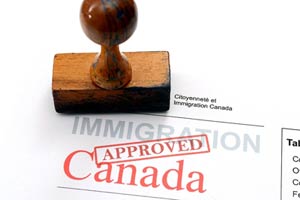
Authorization to Return to Canada (ARC)
The Application for Authorization to Return to Canada (ARC) is a crucial document for individuals who have been deported or removed from Canada and seek permission to re-enter the country.
Eligibility for Authorization to Return to Canada (ARC)
The ARC is designed for individuals who have been deported or removed from Canada and wish to return. To qualify for an Authorization to Return to Canada (ARC), applicants must meet specific eligibility criteria, including:
- Having been deported or removed from Canada. This criterion pertains to individuals who have previously been deported or forcibly removed from Canada due to various reasons such as immigration violations, criminal activities, or other infractions of Canadian immigration laws. It is essential for applicants to provide detailed documentation confirming their deportation or removal status, including official notices or correspondence from immigration authorities outlining the reasons for their removal.
- When you apply for Authorization to Return to Canada, you need to demonstrate compelling reasons for wanting to return to Canada. Individuals who have experienced deportation or removal from Canada often face significant challenges when seeking re-entry. The circumstances surrounding their deportation or removal, such as the nature of the violation or infraction, are critical factors that immigration authorities consider when assessing Authorization to Return to Canada (ARC) applications. Therefore, applicants must provide comprehensive details regarding their previous removal from Canada to ensure transparency and accuracy in their Authorization to Return to Canada (ARC) application.
- Providing evidence of rehabilitation and demonstrating a commitment to complying with Canadian immigration laws. Applicants must articulate strong and compelling reasons for seeking to return to Canada despite their previous deportation or removal. These reasons may include familial ties, employment opportunities, educational pursuits, or humanitarian considerations. It is crucial for applicants to clearly outline their motivations for wanting to return to Canada and to provide supporting evidence to substantiate their claims.
- In addition to providing evidence of rehabilitation and compelling reasons for wanting to return to Canada, individuals applying for an Authorization to Return to Canada (ARC) must also demonstrate ample ties to their home country. These ties serve as assurances to Canadian immigration authorities that the applicant has genuine reasons to exit Canada upon the expiration of their authorized stay and is not likely to overstay their visa or violate immigration laws. Ample ties to the home country typically include various factors that indicate the applicant's significant connections, obligations, and responsibilities in their country of origin. These ties help establish the applicant's intention to return to their home country following their visit to Canada and mitigate concerns regarding their potential to remain in Canada unlawfully.
Examples of ample ties to the home country for purpose of Authorization to Return to Canada (ARC)
- Demonstrating close familial relationships, such as spouse, children, parents, or other relatives residing in the home country, can serve as strong indicators of ties to the home country. Providing documentation, such as marriage certificates, birth certificates, or family photos, can substantiate these relationships.
- Presenting evidence of stable employment, business ownership, or financial investments in the home country underscores the applicant's economic ties and obligations. This may include employment contracts, business registration documents, tax returns, or bank statements.
- Ownership of real estate properties, land, or long-term rental agreements in the home country signifies a significant financial commitment and ongoing ties to the applicant's country of origin. Providing property deeds, lease agreements, or utility bills can support these claims.
- Active participation in community organizations, religious institutions, or social groups in the home country demonstrates social integration and ongoing connections within the local community. Supporting documents, such as membership certificates, volunteer records, or letters of recommendation, can validate these ties.
Enrollment in educational institutions, participation in professional associations, or ongoing professional development activities in the home country indicate a commitment to personal and career advancement within the local context. Providing academic transcripts, enrollment letters, or professional membership certificates can substantiate these ties.
Overall, demonstrating ample ties to the home country is essential for Authorization to Return to Canada (ARC) applicants to reassure Canadian immigration authorities of their genuine intention to depart Canada upon the conclusion of your authorized stay. By presenting compelling evidence of familial, economic, social, and professional connections to the home country, you can strengthen your Authorization to Return to Canada (ARC) applications and enhance your prospects of obtaining authorization to return to Canada.
Departure Order
A Departure Order is a legal document issued by Canadian immigration authorities mandating the departure of an individual from Canada within a specified period. It is typically issued when a foreign national or permanent resident is found to be in violation of Canadian immigration laws or has failed to comply with the conditions of their visa or status.
A Departure Order may be issued for various reasons, including overstaying a visa, working without authorization, or failing to meet residency obligations as a permanent resident.
Upon receiving a Departure Order, the individual is given a specific period, usually 30 days, to voluntarily leave Canada. It is the individual's responsibility to make arrangements for their departure from Canada within the specified timeframe.
Failure to comply with a Departure Order can result in further immigration consequences, such as being issued an Exclusion Order or facing deportation. So, when a departure order is issued, if you exit within the given period, you can return to Canada without applying for an Authorization to Return to Canada. However, if you stay beyond the departure order, then you will require an ARC to return to Canada.
Exclusion Order
An Exclusion Order is a legal document that prohibits an individual from entering or returning to Canada for a specified period. It is typically issued when a person is found to be inadmissible to Canada due to various reasons, including criminality, misrepresentation, or health concerns.
An Exclusion Order may be issued if an individual is deemed inadmissible to Canada for reasons such as criminal convictions, security concerns, or health issues. Sometimes an exclusion order can be given to applicants for working illegally in Canada.
The Exclusion Order imposes a ban on the individual's entry to Canada for 12 months. Immigration authorities enforce the Exclusion Order by recording the individual's details in their immigration database and flagging them to prevent entry at ports of entry.
If you are unable to remain outside of Canada for the full 12-month period, you must submit an Authorization to Return to Canada (ARC) application to seek authorization for an earlier return. Conversely, if you can adhere to the 12-month requirement, you may re-enter Canada without the need for an ARC application.
Deportation Order
A Deportation Order is a legal document issued by Canadian immigration authorities mandating the removal of an individual from Canada due to serious immigration violations or criminal convictions.
Upon issuance of a Deportation Order or a letter of deportation, the individual may face detention and undergo a removal process. Unlike Departure Orders and Exclusion Orders, individuals subject to a Deportation Order require an Authorization to Return to Canada (ARC) to re-enter the country lawfully in the future.
While Departure Orders and Exclusion Orders mandate departure or prohibit entry without requiring an Authorization to Return to Canada (ARC), a Deportation Order necessitates an Authorization to Return to Canada (ARC) for lawful re-entry into Canada due to the severity of the immigration violation.
Summary of 3 types of Removal Orders
If you've been issued a removal order in Canada, it means you're required to leave the country within a specific timeframe.
These removal orders, issued by the CBSA, come in three types:
- Departure Orders necessitate leaving Canada within 30 days of the order taking effect. Upon departure, you must confirm with the CBSA at your port of exit. Fulfilling these requirements allows for future re-entry into Canada, provided you meet entry criteria at that time.
- Exclusion Orders mandate leaving Canada, with confirmation of departure from the CBSA at the port of exit, after which you'll receive a Certificate of Departure. Under an exclusion order, re-entry to Canada is barred for one year. To return sooner or in the absence of a Certificate of Departure, an Authorization to Return to Canada (ARC) is necessary. If the exclusion order resulted from misrepresentation, re-entry is prohibited for five years, along with repayment of CBSA costs for removal.
- Deportation Orders permanently prohibit return to Canada unless an Authorization to Return to Canada (ARC) is obtained.
The exclusion period's commencement depends on the order's origin: within Canada, it begins upon departure; from outside Canada, it begins from the exclusion order's date.
Failure to comply with a removal order's requirements, such as attending interviews or appearing on the removal date, may lead to a nationwide arrest warrant and detention until removal.
Documents Required for ARC Application
When applying for an Authorization to Return to Canada (ARC), you must provide a comprehensive set of documents to support your case, including:
- Personal identification documents, such as a passport or birth certificate.
- Legal documents confirming the deportation or removal from Canada.
- A detailed explanation of the reasons for seeking to return to Canada.
- Evidence of significant ties to your home country.
- Any additional supporting documents that strengthen your case.
Tips for a Successful Authorization to Return to Canada (ARC) Application
- Clearly articulate the reasons for seeking to return to Canada and demonstrate a genuine desire to abide by Canadian immigration laws.
- If you were removed for reasons of criminality, then highlight any efforts made towards rehabilitation since the deportation or removal from Canada, such as participation in rehabilitation programs or community service. Submit and obtain a Criminal Rehabilitation prior to submitting the Authorization to Return to Canada (ARC) application.
- Consulting with an experienced immigration lawyer or consultant can greatly improve the chances of a successful Authorization to Return to Canada (ARC) application. Akrami & Associates Immigration Law firm can provide guidance on the application process and help gather the necessary documents.
- Ensure that all required forms are completed accurately and that supporting documents are organized and presented clearly. A well-prepared application package can expedite the processing time and enhance the likelihood of approval.
How Akrami & Associates Can Assist you with your Authorization to Return to Canada Application
At Akrami & Associates, our team specializes in immigration matters, including Authorization to Return to Canada (ARC) applications. We'll assess your eligibility for an ARC and provide personalized guidance based on your individual circumstances. Our experts will assist you in gathering the necessary documents and preparing a comprehensive application package. We'll handle the entire application process on your behalf, ensuring that all forms are completed accurately and submitted within the required timeframe. Throughout the Authorization to Return to Canada (ARC) application process, we'll provide continuous support and updates, addressing any concerns or questions you may have.
With Akrami & Associates Immigration Law Firm by your side, you can navigate the Authorization to Return to Canada (ARC) application process with confidence, knowing that you have experienced professionals advocating for your interests. Book a consultation today to learn more about how we can assist you with your Authorization to Return to Canada application.



